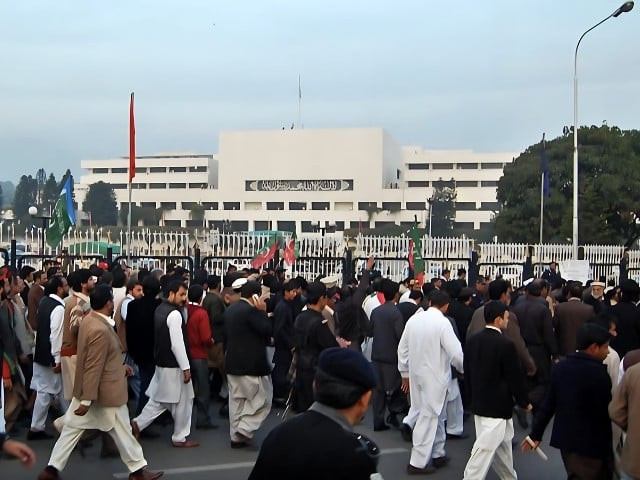NA passes ‘Peaceful Assembly and Public Order Bill 2024’ amid opposition outcry
Under new law, organisers must apply to the DC at least seven days prior to holding any public gathering in Islamabad

The National Assembly on Thursday passed the Election Act Amendment Bill and the Peaceful Assembly and Public Order Bill, following approval by the Senate.
The session, chaired by Speaker Ayaz Sadiq, saw the introduction of the Election Act Amendment Bill 2024 by Parliamentary Affairs Minister Azam Nazir Tarar. After voting, the bill was passed by a majority.
The Senate had already approved the bill earlier.
Barrister Daniyal Chaudhry of the Pakistan Muslim League-Nawaz (PML-N) introduced the Peaceful Assembly and Public Order Bill 2024 as a supplementary agenda item.
Although members of PTI and Sunni Ittehad Council strongly opposed the bill, it was passed by a majority vote. The opposition members protested, chanting "No, no" in the assembly.
The bill had been passed by the Senate a day earlier. With approval from both houses, the bills will now be sent to the president for final endorsement to become law.
Under the new law, the Deputy Commissioner (DC) of Islamabad will grant permission for rallies. In case of rejection, an appeal can be made to the Chief Commissioner.
If unsatisfied, the decision can be further challenged before the Interior Secretary. The government will designate specific areas for gatherings, which will be officially notified.
For any public gathering in Islamabad, organizers must submit an application to the DC at least seven days in advance.
The application must include details of the location, number of participants, and the event's purpose. The DC will have the authority to reject the request, providing written reasons for doing so.
Before granting permission, the DC will review the security situation and obtain clearance from law enforcement agencies. Gatherings will only be allowed in designated areas.
The DC can amend or revoke permissions based on national security risks, potential violence, or public safety concerns. The government may also declare certain areas as "Red Zones" or "High-Security Zones."
If a gathering poses a threat to public safety or national security, the DC has the authority to ban it. Reasons for the ban must be provided in writing, and the affected party can appeal the decision within 15 days.
The DC can instruct the police to disperse a gathering if it disrupts public order. In cases of non-compliance, the police may use force to disband the assembly.
Under the new law, participants in unauthorized gatherings may face arrest and detention. Those found guilty could face up to three years in prison and fines. Repeat offenders could be sentenced to up to 10 years.
Meanwhile, PTI member Jamshed Dasti pointed out a quorum issue, leading to the adjournment of the National Assembly session until Monday at 5 PM.



















COMMENTS
Comments are moderated and generally will be posted if they are on-topic and not abusive.
For more information, please see our Comments FAQ